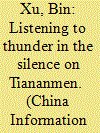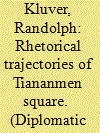|
|
|
Sort Order |
|
|
|
Items / Page
|
|
|
|
|
|
|
| Srl | Item |
| 1 |
ID:
184088


|
|
|
|
|
| Summary/Abstract |
‘Forgetting’ has been widely used in academic and public discourses of the memory of the 1989 Tiananmen Incident. The term, however, is conceptually unclear, empirically ineffective, and ethically problematic. Conceptually, it relies on a problematic assumption that silence means forgetting. Empirically, it lumps together different states of memory: ‘don’t remember, don’t talk about, don’t know, and don’t care.’ Ethically, it allows a broad, unjust moral accusation of those who remember but remain silent for various reasons. I argue that ‘silence’ provides greater conceptual precision, more analytical subtlety, and less ethical liability. Silence does not mean forgetting. Nor does it always mean the complete absence of sound. Rather, it refers to the absence of certain discourses about the past. I propose a perspective based on different forms of silence – ‘silencing, silenced, and silent’ – and illustrate it in an analysis of the memory of Tiananmen. Contrary to conventional wisdom, the analysis shows that the Chinese state initially intended to create a ‘covert silence’ – forcing people to remember rather than forget the official stories and silencing other narratives – and then an ‘overt silence’ in which all mention of the event was absent. Even underneath overt silence, however, are various experiences with ambiguities and nuances. The term silence also recognizes individuals’ ethical-political dilemmas under a repressive regime and aims to provide a language for an equal and inclusive truth-and-reconciliation process in the future.
|
|
|
|
|
|
|
|
|
|
|
|
|
|
|
|
| 2 |
ID:
095517


|
|
|
|
|
| Publication |
2010.
|
| Summary/Abstract |
In April and May of 1989, the protest movement that began in Tiananmen Square, in the center of Beijing, became one of the most dramatic and defining episodes in the presidential administration of George H. W. Bush. Global media covered the events daily, feeding images around the globe of students engaged in a standoff with police and military units. While the movement began as mourning for the death of the reformer Hu Yaobang, the drama quickly took on a different character, as students turned their attention from Hu Yaobang and towards perceived failures of the Communist Party of China (CPC) and corruption. The movement ultimately culminated in the bloody military crackdown against the protesters on the night of June 3-4, 1989.
|
|
|
|
|
|
|
|
|
|
|
|
|
|
|
|
| 3 |
ID:
057231


|
|
|
|
|
|
|
|